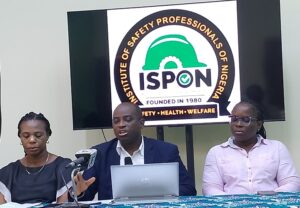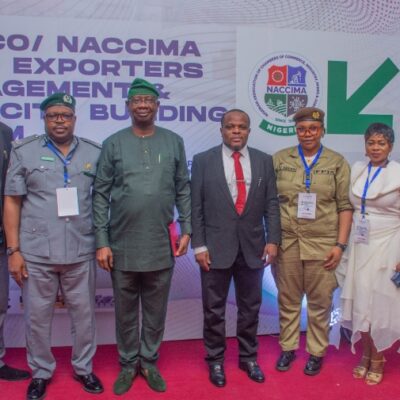
BY OLAPEJU OLUBI
The Lagos State Branch of the Institute of Safety Professionals of Nigeria (ISPON) has called for a major shift in workplace health and safety standards through the adoption of artificial intelligence (AI) and digital technologies.
This call to action was made at a press conference today in commemoration of the 2025 International Labour Organization (ILO) World Day for Safety and Health at Work (WDSHW), themed “Revolutionising Health and Safety: The Role of AI and Digitalization at Work.”
Addressing participants, Olusola Ogunleye, Chairman, ISPON Lagos Branch, emphasized that health and safety are not merely regulatory obligations but fundamental pillars of human dignity, innovation, and national productivity.
While significant progress has been made since the early days of the industrial revolution, the chairman noted that today’s rapidly evolving technological landscape demands a new approach to workplace safety.
He noted; “Artificial intelligence, once considered a futuristic dream, is now an essential tool for predicting hazards and preventing accidents before they occur. AI-powered systems can analyze data in real-time, detecting patterns and risks that are often invisible to the human eye.
“Wearable devices have also emerged as vital allies, monitoring workers’ vital signs and alerting supervisors to signs of fatigue or stress before they escalate into health crises.
“Furthermore, digitalization is transforming workplaces through smart technologies such as Internet of Things (IoT) systems, which monitor air quality, temperature, and noise levels to create safer and healthier environments.
Ogunleye said Immersive digital training platforms are providing workers with the opportunity to experience high-risk scenarios virtually, equipping them with critical skills without exposing them to actual danger.
He highlighted that the benefits of these advancements are profound — not only in reducing workplace incidents and enhancing operational efficiency, but most importantly, in saving lives.
However, the Institute cautioned that the digital revolution must be approached with responsibility.
Ogunleye stressed that as Nigeria embraces AI and digital technologies in workplaces, ethical considerations, data privacy, and inclusivity must be prioritized to ensure that no worker is marginalized or left behind.
In his remarks, ISPON called for the establishment of clear regulatory frameworks that define how AI and digitalization should be responsibly deployed to uphold workplace safety and health standards.
The Institute stressed the need for investments in building workforce capacity, equipping workers and safety officers with the necessary knowledge and skills to manage emerging risks associated with AI-powered systems.
Governments and industries were also urged to invest in reliable technologies and infrastructure, while research institutions should be supported to deepen the understanding of how AI and digitalization impact health and safety outcomes.
Furthermore, ISPON advocated for strong collaboration among government agencies, industry stakeholders, private sector players, and academia to develop innovative solutions tailored to Nigeria’s unique challenges.
The Institute emphasized that ethical implementation of AI is crucial, and that human oversight must be maintained to prevent over-reliance on automated systems.
Raising public awareness about the benefits and risks of digital safety tools and highlighting success stories from local industries were identified as key steps to encourage widespread adoption.
The Institute also pointed out that stable electricity and internet connectivity are critical enablers of the digital transformation in workplaces.
It therefore called on relevant authorities and private sector players to expand access to reliable energy and digital infrastructure, especially in remote and underserved areas.
As Nigeria’s chartered professional body for the practice and management of safety, ISPON reaffirmed its readiness to work hand-in-hand with government ministries, departments, agencies, and private organizations to tackle the safety and health challenges that accompany the digital age.
The Institute expressed confidence that with collective commitment, Nigeria can create a future where technology not only enhances productivity but also safeguards the health and dignity of every worker.
The ISPON Lagos State Branch also charged participants with its call to action on an optimistic note and declared that the future of workplace health and safety is bright.
It noted that by embracing AI and digitalisation as partners, and through responsible collaboration, Nigeria can build safer, smarter, and more resilient workplaces for generations to come.
Olapeju is a journalist and aviation reporter.





